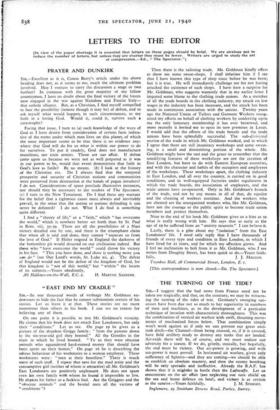EAST END MY CRADLE "
Sta,—In one thousand words of verbiage Mr. Goldman en- deavours to hide the fact that he cannot substantiate certain of his stories. Let us leave it at that. These stories are no more monstrous than others in his book. I can see no reason for believing any of them.
On one point it is possible to test Mr. Goldman's veracity. He claims that his book does not attack East Londoners, but only their " conditions." Let us see. On page 19 he gives us a picture of the drunken Griggs family : from the parents down to the six-year-old girl they boozed." All the Gentiles in the slum in which he lived boozed. " To us they were obscene animals who squandered hard-earned money that should have been spent on their homes." On page 16 he is describing the odious behaviour of his workmates to a woman employee. These workmates were : " men at their beastliest." There is much more of such stuff. I repeat that save for the mad artist and the consumptive girl (neither of whom is attractive) all Mr. Goldman's East Londoners are positively unpleasant. He does not spare even his own family with whom he found it impossible to live. He depicts his father as a feckless fool. Are the Griggses and the "obscene animals" and the bestial men all the victims of " conditions "? Then there is the tailoring trade. Mr. Goldman kindly offers to show me some sweat-shops. I shall infuriate him if I say
that I have known this type of shop since before he was born; but it is true. He will immediately challenge me for.not having attacked the existence of such shops. I have here a surprise for Mr. Goldman, who suggests wantonly that in my earlier letter I imputed some blame to the clothing trade unions. As .a member of all the trade boards in the clothing industry, my attack on low wages in the industry has been incessant, and the attack has been made in continuous association with the unions. Twenty years ago the National Union of Tailors and Garment Workers recog- nised my efforts on behalf of clothing workers by conferring upon me the only honorary membership it has ever bestowed, and more recently it invited me to open its new premises in Leeds. I would add that the efforts of the trade boards and the trade unions have been splendidly successful. The sub-divisional section of the trade in which Mr. Goldman worked, and in which I agree that there are still insanitary workshops and some sweat- ing, is a small and diminishing portion of the whole. Mr. Goldman might have the tact and the grace to remember that the unedifying features of these workshops are not the creation of East London, but have to do with Eastern European countries, and with the character and habits of the occupiers and employees of the workshops. These workshops apart, the clothing industry in East London, and all over the country, is carried on in good conditions, and in well-equipped factories under regulations in which the trade boards, the association of employers, and the trade unions have co-operated. Only in Mr. Goldman's branch of the trade, and not by any means in all of that, do squalor and the cheating of workers continue. And the workers who. are cheated are the unorganised workers who, like Mr. Goldman, have not the courage or the public spirit to become trade union members and protect themselves.
Near to the end of his book Mr. Goldman gives us a hint as to what is really wrong with him. He says that as early as the age of 19 he suffered from an " anxiety neurosis." I can believe it.
Lastly, there is a gibe about my `,.` isolation " from the East Londoners' life. I need only reply that. I have thousands of friends of every type and condition in East London, in, which I have lived for 21 years, and for which my affection grows. And I feel no inclination to bolt from it as Mr. Goldman, who I see writes from Doughty Street, has been quick to do.—Yours faith- [This correspondence is now closed.—ED. The Spectator.]






























 Previous page
Previous page